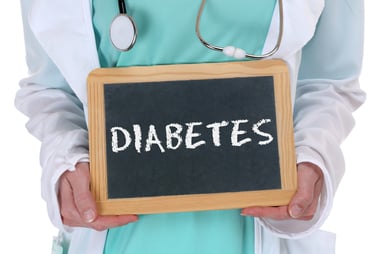When is Insulin a Good Choice?

- Insulin may be necessary if your blood sugars are too high despite your current medication.
- What is too high? Your average sugar as shown by hemoglobin A1c is above 7% or your other finger sticks are greater than 150.
- Oral medicines and non-insulin injectables are causing side effects.
- Multiple medications are too expensive due to copays or aren’t covered by insurance. With the addition of insulin, less oral medication may be required, and you will ultimately save money.
Why Are My Sugars High?
- Diet - Some foods require less insulin for your body to process. Food falls into 3 categories: Protein, Fats, and Carbohydrates. Protein and fats require less insulin to process, and carbohydrates require more insulin. Simple carbohydrates and sugars require the most insulin. Decreasing the processed food, carbohydrates and sweets can markedly improve your diabetic control.
- Inadequate Physical Activity - Physical activity makes the insulin you have work better. Exercise burns carbohydrates and sugar for energy and directly lowers your blood sugar.
- Diabetes Progression - Diabetes is a progressive disease. Just like any other disease, medications need to be adjusted. This could mean increasing the dose of a medicine you are already on or adding a new class of medicine such as insulin. Within 5-10 years of your diabetes, your pancreas will likely produce less insulin, and you will become insulin deficient. In addition, and most importantly, you will develop resistance to insulin, and the insulin you do have will be less able to lower your sugar.
Why Take Insulin for My High Sugars & Inadequately Controlled Diabetes? - I Feel Fine
- Cardiovascular Disease - Inadequately controlled diabetes increases your risk of heart attacks and strokes.
- Diabetic Neuropathy - Diabetic neuropathy is pain, numbness, or tingling in the feet, legs, or hands. See our blog, “Are You Curious About Diabetic Neuropathy?” for more information.
- Kidney Disease - This can cause swelling, fatigue, shortness of breath, and can result in the need for dialysis if the kidneys fail completely. See our blog, "Great News! Treatment Options for Chronic Kidney Disease" for more information.
- Peripheral Vascular Disease - Peripheral vascular disease (PVD) is inadequate circulation to the legs, and it can cause pain when walking. It can also result in amputations related to non-healing ulcers.
- Eye Problems - Some causes of blurred vision will correct within a few months of getting your diabetes under control, however diabetes can also cause retinal problems causing permanent vision loss. Treatments such as laser and other eye procedures can be used to minimize future vision loss, but many people lose enough vision to interfere with daily activities and even go completely blind as a result of diabetes.
You may not really feel fine. You may not realize that you have decreased energy, sleep disturbances, blurred vision, thirst, the need to drink and urinate more, as well as have frequent bladder or yeast infections. You may have become used to these symptoms, but you could feel much better if your sugar was controlled.
Types of Insulin
 The pancreas produces insulin throughout the day. A small amount is released continuously to cover baseline metabolism. Extra amounts are released in response to food.
The pancreas produces insulin throughout the day. A small amount is released continuously to cover baseline metabolism. Extra amounts are released in response to food.
When you first start on insulin, you may be placed on only long-acting insulin. These are given once daily, but pharmaceutical companies are currently developing insulin that you would only take once weekly. Long-acting insulin provides coverage for baseline metabolism. However, as diabetes progresses or depending on your specific situation, you may require both a long-acting insulin and a short-acting insulin. The short acting insulin is taken in association with meals to provide the extra amount to act on the glucose released from food.
There are also intermediate acting insulins and combination insulins, but the most commonly used insulins are the long-acting insulins and the short-acting insulins.
Upsides of Insulin
- It may be very effective either alone or in combination with oral medications.
- Long term complications of diabetes can be prevented or delayed leading to a healthier life.
Downsides of Insulin
- Weight gain if not taken correctly.
- Hypoglycemia if sugars are not monitored closely.
Clinical Research
Chase Medical Research has experience in conducting trials for diabetes and many other diseases. If you are interested in participating in one of our trials, please check out our website for currently enrolling trials. We have a number of trials involving diabetes, reducing cardiovascular risk in diabetes, and starting insulin in diabetics.
Share This Post
Recent Posts
- The Relationship Between Obesity and Obstructive Sleep Apnea March 31 2023
- Cardiovascular Outcome Clinical Trials March 31 2023
- Diabetic Peripheral Neuropathic Pain March 31 2023
- Are All Types of Cholesterol Bad? March 31 2023
- Blood Pressure: The Highs, the Lows, and Everything in Between March 31 2023
Categories
- Clinical Trials
- Cardiovascular Disease
- Diabetes
- Obesity
- Kidney Disease
- Hypertension
- Pain Management
- Vaccine
- Cholesterol
- Chronic Obstructive Pulmonary Disease
- Diabetic Peripheral Neuropathy
- Migraine
- Osteoarthritis
- Biologics
- COVID-19
- Gastroesophageal Reflux Disease
- Irritable Bowel Syndrome with Constipation
- Lyme Disease
- Nonalcoholic Steatohepatitis
- Respiratory Syncytial Virus


